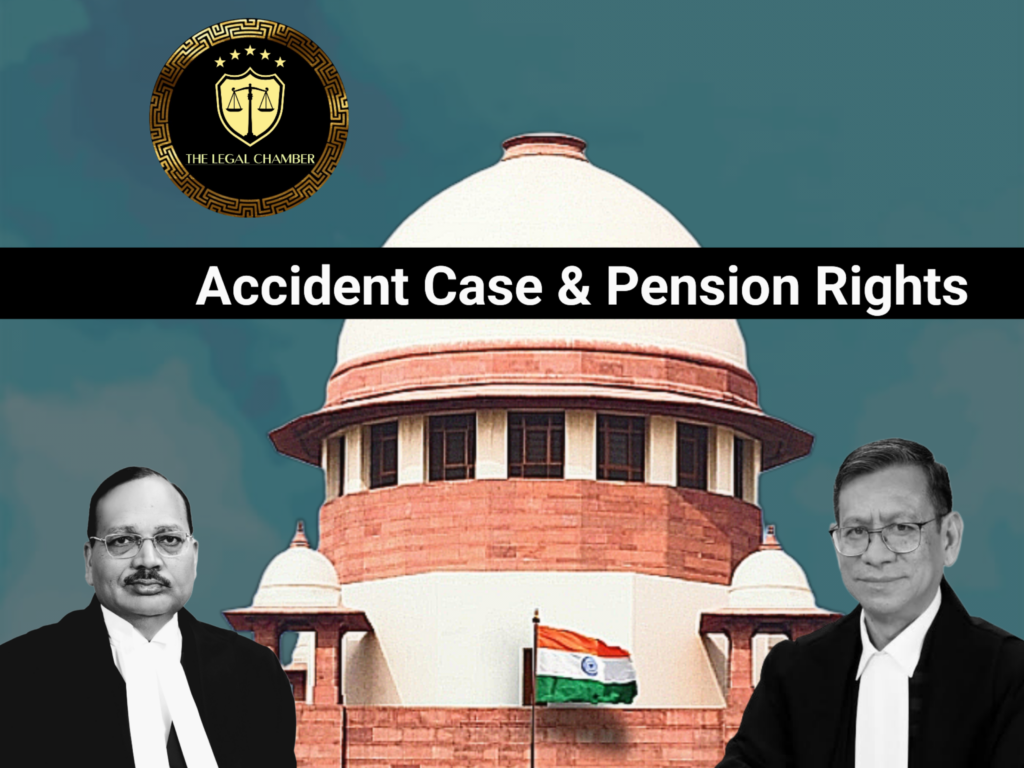
The Supreme Court ruled that pension benefits cannot be deducted from salary when computing motor accident compensation, as they are statutory rights unrelated to the accident. It upheld 78% disability (overriding lower courts’ 50-61.94% assessments) and mandated 30% future prospects for the 43-year-old victim. The Court enhanced compensation to ₹67.36 lakhs with 7% interest, applying multipliers consistently with Sarla Verma and Pranay Sethi precedents, while clarifying that post-accident medical assessments must prevail over initial disability evaluations if unrebutted.
Facts Of The Case:
On May 10, 2010, Hanumantharaju B., a CRPF Sub-Inspector, met with a motor accident in Bengaluru when an Omni car collided with his motorcycle. He suffered grievous injuries, underwent multiple surgeries, and was hospitalized for 15 days. A Medical Board initially assessed his disability at 61.94%, leading to his discharge from service in 2012. He filed a claim for ₹74 lakhs before the Motor Accidents Claims Tribunal (MACT), which awarded ₹3.28 lakhs in 2014. On remand, the MACT enhanced compensation to ₹31.64 lakhs, considering 50% disability and deducting taxes from his salary. The Karnataka High Court further reduced this to ₹27.47 lakhs by deducting his pension and retaining the lower disability assessment.
In appeal, the Supreme Court rejected the pension deduction, citing Vimal Kanwar and Pranay Sethi, and accepted a later medical assessment pegging disability at 78%. It recalculated compensation by adding 30% future prospects to his last drawn salary (₹36,231/month), applying a 14x multiplier, and awarded ₹67.36 lakhs with 7% interest. The Court held insurers and the car owner jointly liable, emphasizing that post-accident medical evidence must prevail if unchallenged. The judgment reinforced principles for disability compensation and future prospects in motor accident claims.
Procedural History:
The case originated with a claim petition filed in 2010 before the Motor Accidents Claims Tribunal (MACT), Bengaluru, seeking ₹74 lakhs in compensation. The MACT initially awarded ₹3.28 lakhs in 2014, which was remanded by the Karnataka High Court in 2015 for reconsideration. Upon reassessment, the MACT enhanced the compensation to ₹31.64 lakhs in 2016, factoring in 50% disability. Dissatisfied, both parties appealed to the High Court, which reduced the award to ₹27.47 lakhs in 2019 by deducting pension benefits and retaining the lower disability assessment. The appellant then approached the Supreme Court via Special Leave Petitions (Nos. 2841-2842 of 2021), which were converted into a civil appeal. In its 2025 judgment, the Supreme Court overturned the High Court’s deductions, accepted a higher disability assessment (78%), and enhanced the compensation to ₹67.36 lakhs with 7% interest, settling the legal debate on pension deductions and future prospects in motor accident claims. The insurer, though contesting earlier, did not challenge the Supreme Court’s final ruling.
Read Also: Supreme Court Clarifies Dependency Rights in Accident Claims
Court Observation:
The Supreme Court made several critical observations while delivering its judgment. It emphasized that pension benefits, being a statutory entitlement, cannot be deducted from salary for computing motor accident compensation, as they are unrelated to the tortious liability arising from the accident. The Court rejected the High Court’s approach of reducing disability assessment from 78% to 61.94%, holding that unchallenged medical evidence from a Tribunal-appointed Commissioner must prevail over earlier evaluations. It underscored the mandatory application of Pranay Sethi principles, ruling that 30% future prospects must be added to the income of victims aged 40-50 years, as the appellant’s promotion opportunities were curtailed by the accident-induced disability.
The Court also noted that loss of earning capacity must be calculated on the actual salary without deductions, and criticized the Tribunal’s arbitrary reduction of disability to 50% despite uncontroverted medical evidence. Additionally, it observed that the High Court erred in slashing interest rates from 9% to 6%, restoring it to 7% for balance. These observations reinforced the precedent-centric approach for quantifying just compensation under the Motor Vehicles Act.
Final Decision & Judgement:
The Supreme Court allowed the appeal in part, significantly enhancing the compensation payable to the appellant. It awarded a total of ₹67,36,084/- with 7% simple interest from the claim petition’s filing date, modifying the High Court’s reduced award of ₹27,47,700/-. The Court held Respondent No. 2 (insurer) and Respondent No. 1 (car owner) jointly and severally liable for this amount, while permitting the insurer to recover from the owner as per law. The judgment expressly rejected the High Court’s deduction of pension benefits from salary calculations, applied 30% future prospects to the appellant’s income (₹36,231/- p.m.), and adopted 78% disability as certified by the Tribunal’s Commissioner. All other heads of compensation (medical expenses, pain/suffering, etc.) were retained as awarded by the High Court. The Court mandated payment within six weeks, emphasizing strict compliance. This decision not only provided substantive relief to the disabled CRPF officer but also settled key legal principles regarding income computation, disability assessment, and future prospects in motor accident claims under the Motor Vehicles Act.
Case Details:
Case Title: Hanumantharaju B (Dead) by L.R. vs. M. Akram Pasha & Anr. Citation: 2025 INSC 682 (Supreme Court of India) Special Leave Petition (Civil) Nos.: 2841-2842 of 2021 Date of Judgment: May 13, 2025 Judges/Justice Name: Hon'ble Mr. Justice Surya Kant & Hon'ble Mr. Justice Nongmeikapam Kotiswar Singh